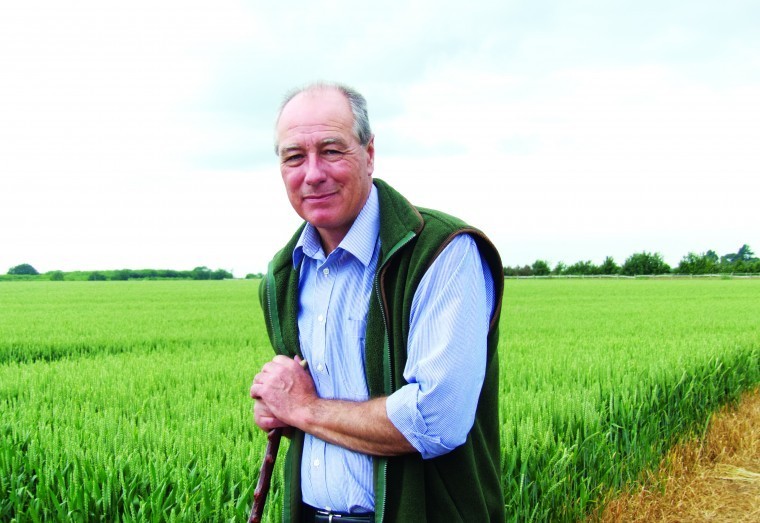Our benign autumn continues with barely a frost to trouble us. I can only recall one morning with ice on the windscreen and we are already half way through November.
Long may it continue as with every passing week the potential for a long harsh winter reduces. There has been little rain which has allowed ground work to continue unimpeded. We are currently grubbing some old fruit orchards and the trees are lifting out of the ground with dry soil around the roots which shakes off easily. Most years the operation would be a mud bath by now. This year the JCB telescopic handlers barely have mud on the tyres, fires are easy to light and burn well.
Looking at the crops they have continued to grow and oilseed is particularly strong. In some fields we have seen early crops running out of nitrogen and leaves are dying back just leaving a strong growing crown but with very good roots below. These crops have begun to look rather untidy but will still winter well and grow away strongly in the spring.
Late drilled crops have made up well and present a good looking crop for the time of year. Last month I mentioned concerns around Centurion Max and black grass resistance in the field. On one farm of heavy weald clay that we have sown with a Clearfield variety of oilseed rape there is an historic black grass resistance problem. Even though this is the first time we have used Centurion Max on those fields nonetheless one can see the tell tale individual black grass plants that are showing clear signs of resistance. We have brought forward the application of Kerb so we get good soil contact and start to tackle the resistant population before the plants get too large. A programmed approach to managing resistance problems is essential as is the ability to change plans with changing circumstances.
Similarly in wheat crops where we have grass weeds emerging through residual herbicides we have over sprayed with contacts while the grass is small and still actively growing as well as topping up the residual actives. In most years field conditions would have stopped spraying by now. But this is certainly not a usual year and while we all struggled in August and September it is very helpful to be given the opportunity to continue to tackle grass weeds this late in the year.
This should have been the month when Europe finally relicensed glyphosate and failed to for the second time this autumn even though the length of renewal has come down from the original 15 years to five years. It is not that they cannot make a decision: rather they will not. So where does science fit in all of this? Clearly the science proves glyphosate is safe to be relicensed and the various European bodies are clear on that.
With genetically modified (GM) Roundup ready crops grown widely in the rest of the world and in particular the United States for many years, one could suggest that full scale human impact trials have been going on for decades with no ill effects. Yet we have the unedifying politics of Europe at its worse and in particular France and Germany. Politically Germany has reaped the whirlwind of immigration just as the UK has and is faced with undue influence from the extremes of the Greens’ environmental policy. One cannot help but think that Europe’s antipathy to GM crops is the main driver for the glyphosate renewal problems and if they can ban glyphosate for spurious reasons then they can defend their position on GM crops.
Still we are leaving at the end of March 2019 and would hope to rely on a science led risk based approval system for plant protection products. Then again we have secretary of state Michael Gove changing DEFRA and the government’s position on a wider ban of neonicotinoids on non flowering crops when there is insufficient evidence of the harmful effects on bees in flowering crops.
That does not bode well for the future. It is an important statement as it effectively prejudges the outcome before we have our own regime in place and no post Brexit secretary of state is going to revisit the matter. What we did not hear from Mr Gove was any commitment to ban the import of any agricultural products from third countries grown with the use of neonicotinoid seed treatments.
This is hypocritical in that he is going to force UK producers to live without the products while allowing imports to be produced with them, and naïve in that it hands our competitors an unfair advantage and will have an impact on the profitability of UK producers just as he hails the huge opportunities UK agriculture will have to compete in the world and produce more. No doubt there will be further installments of Mr Gove’s clear vision for agriculture in the next few months unless he moves upwards and onwards.
To add insult to injury I had the pleasure of an email from Keith Taylor the South East’s MEP for the Green Party as a further response to earlier correspondence regarding neonicotinoid seed treatments which welcomed the government’s change of position. He flagged up the alternative of low pesticide input pest management prioritising non chemical methods which he urged me to adopt.
Clearly he fails to understand the issues around virus infection by aphid vectors and that alternatives to pesticide control do not exist. No doubt he does understand his electorate and on this matter holds common views to them. His biggest concern is that emergency authorisations will be available to DEFRA to bypass any ban if farmers can demonstrate essential need. So far we have not had much success with that route. We do have the fall back of spraying pyrethroid products but only if they are not banned or resistance renders them ineffective. Where then for autumn sown cereal production in this country?




